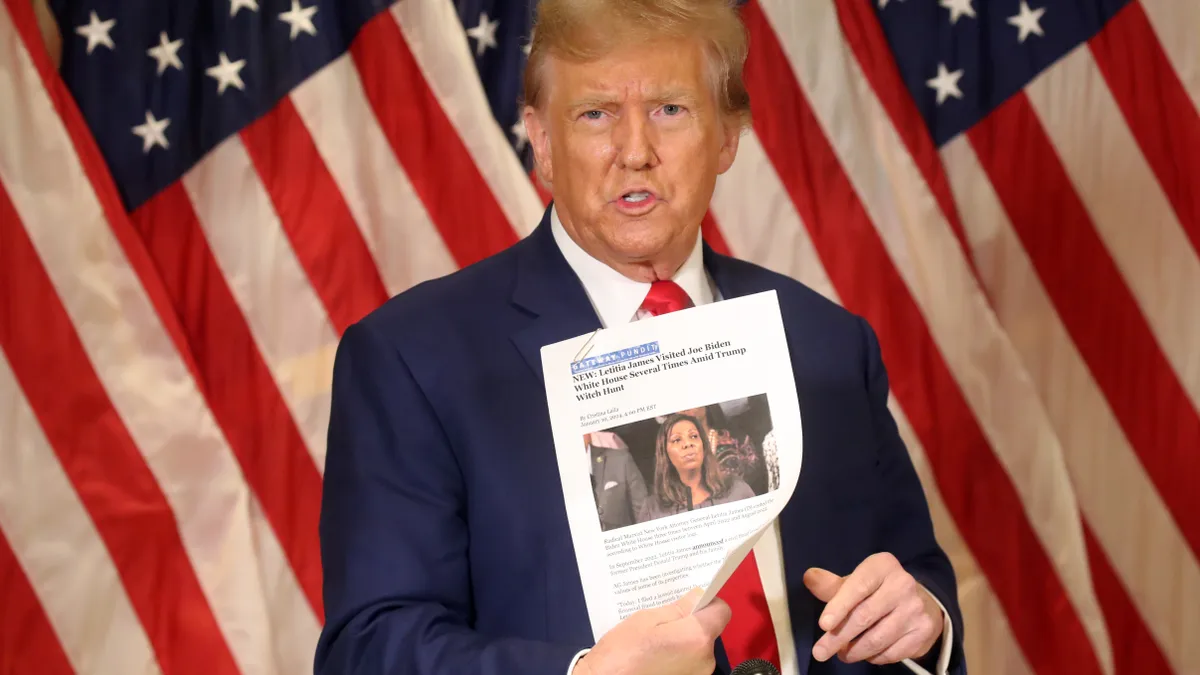Dive Brief:
- Judge Arthur Engoron heard from former President Donald Trump as well as attorneys making closing arguments Thursday in New York Attorney General Letitia James’ civil fraud case against the ex-president, the Trump Organization and key officials in the sprawling real estate business — including Trump’s two adult sons and the company’s former CFO Allen Weisselberg.
- The NY AG is asking the judge to impose a $370 million fine on the organization, an increase from the $250 million it sought upon bringing the case originally, in response to its assertion that Trump Organization executives — including Trump himself and Weisselberg — fraudulently inflated the former president’s net worth to obtain bank loans with more favorable terms than would have otherwise been available.
- Trump reiterated his stance that he had done nothing wrong and that the Trump Organization’s statements of financial condition (SOFC) were “perfect” in court Thursday. “We should receive damages for what we’ve been through,” the former president declared, decrying the case as a “political witch hunt.”
Dive Insight:
Attorneys Thursday laid out their closing arguments in a final tug-of-war over whether the errors in the Trump Organization’s SOFCs show intent to defraud and who ultimately bears responsibility.
Judge Engoron has already found the Trump Organization liable for fraud while both the former president and his attorneys have repeatedly denied wrongdoing. Trump attorney Chris Kise during his closing arguments, for example, made multiple references to the previous testimony of defense witness Eli Bartov, a professor of accounting at New York University’s Stern School of Business, who claimed the AG’s case has “no merit,” and that the SOFCs are compliant with GAAP.
Engoron countered the assertion by stating that he did not give Bartov’s testimony “much credence.” In a denial of one of the Trump legal team’s requests for a directed verdict, Engoron stated that “the most glaring flaw is to assume that the testimony of defendants’ experts,” including Bartov, is “true and accurate.”
Meanwhile, the NY AG’s office has asserted the former president, his sons and the ex-cfo — also named defendants in the trial — all bear some culpability for the financial misstatements in the organization’s SOFCs.
“What this trial is about is, what did the defendants know, when did they know it, and did they act as a conspiracy?” NY AG Kevin Wallace said in closing arguments Thursday. The answer to the latter question is yes, he said.
The roles of the ex-CFO and the organization’s ex-controller, Jeffrey McConney, in particular, have faced heightened scrutiny; both are long-time veterans of the Trump Organization. Weisselberg left the organization after inking a $2 million severance agreement with the organization and pleading guilty with the state of New York for tax fraud. McConney, meanwhile, also departed the organization and previously testified that he had inflated the valuations of some key Trump properties under scrutiny.
Wallace pointed to the severance paid to both executives in his closing arguments as evidence that proves intent to defraud.
“That someone would have committed, admitted and been convicted of financial crimes and then get a $2 million bonus is suspicious,” Wallace said in response to questions by Engoron about why Weisselberg’s severance amount raised red flags.
As well as the $370 million fine, the NY AG is also seeking lifetime bans from the state’s real estate industry and from acting as a New York company executive for former president Trump, Weisselberg and McConney, CFO Dive previously reported. The AG is also asking for similar five-year bans for both Donald Trump Jr. and Eric Trump.
Defense attorney Alina Habba argued that Weisselberg and McConney’s conduct has only fallen under close scrutiny as a way for the AG to reach the former president.
“That’s why they’re named as defendants, to get to President Trump,” Habba said Thursday. “They’re trying to intimidate my other clients to get to him.”
Habba’s comments dipped into the political undercurrents underpinning the trial, which bubbled over even before the start of closing arguments. Court proceedings were delayed Thursday after the judge received a bomb threat hours before the trial was slated to resume, NBC reported.
During his closing statements, Kise also took multiple jabs at the NY AG, arguing the AG’s office has not met its burden of proof for the case, that it is asking Judge Engoron to impose a “corporate death penalty” on the Trump Organization, and that the AG is coming after the former president for a “victimless crime” with political motivations.
The judge has clashed with both the president’s legal team and the former president himself at several points during the trial regarding the appearance of political bias. Trump’s comments occurred after Engoron denied the former president’s request to speak Wednesday when Trump declined to agree to the judge’s request that he stick to speaking about “relevant” matters and avoid “delivering a campaign speech,” according to an AP news report.
Trump spoke after Kise asked the judge to reconsider his ruling, prompting Engoron to reiterate his previous requests and asking Kise to “control his client” after Trump protested that he was being “persecuted by someone running for office” and that he had “never had a problem” previously conducting business in the state.
“You say you’ve never had a problem. You’ve never been sued?” Engoron asked the former president.
Engoron is aiming to issue a final ruling by Jan. 31, he said.












